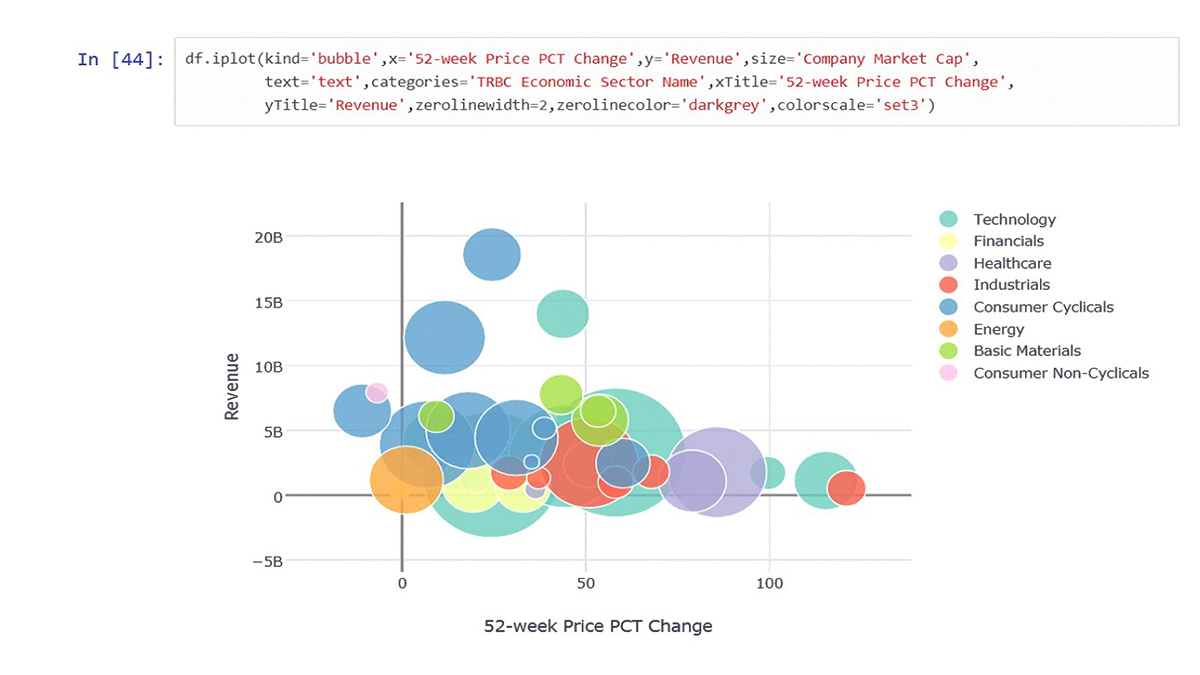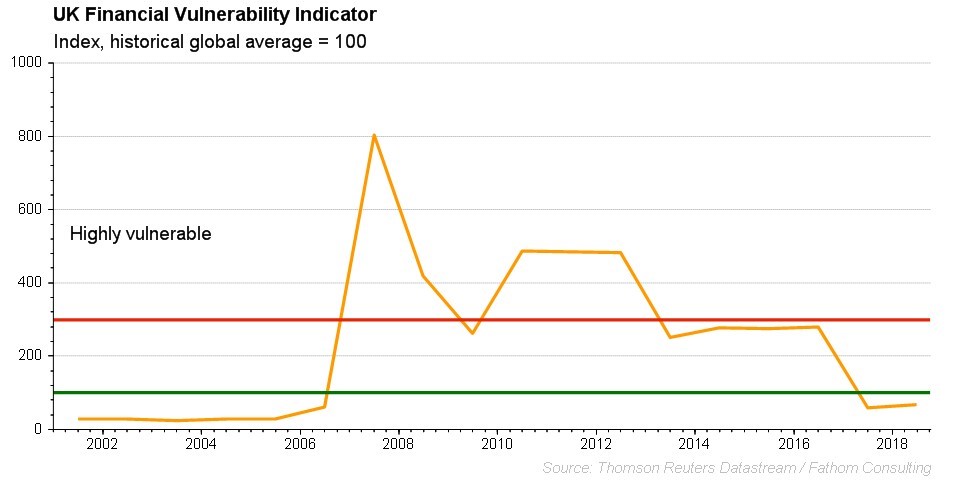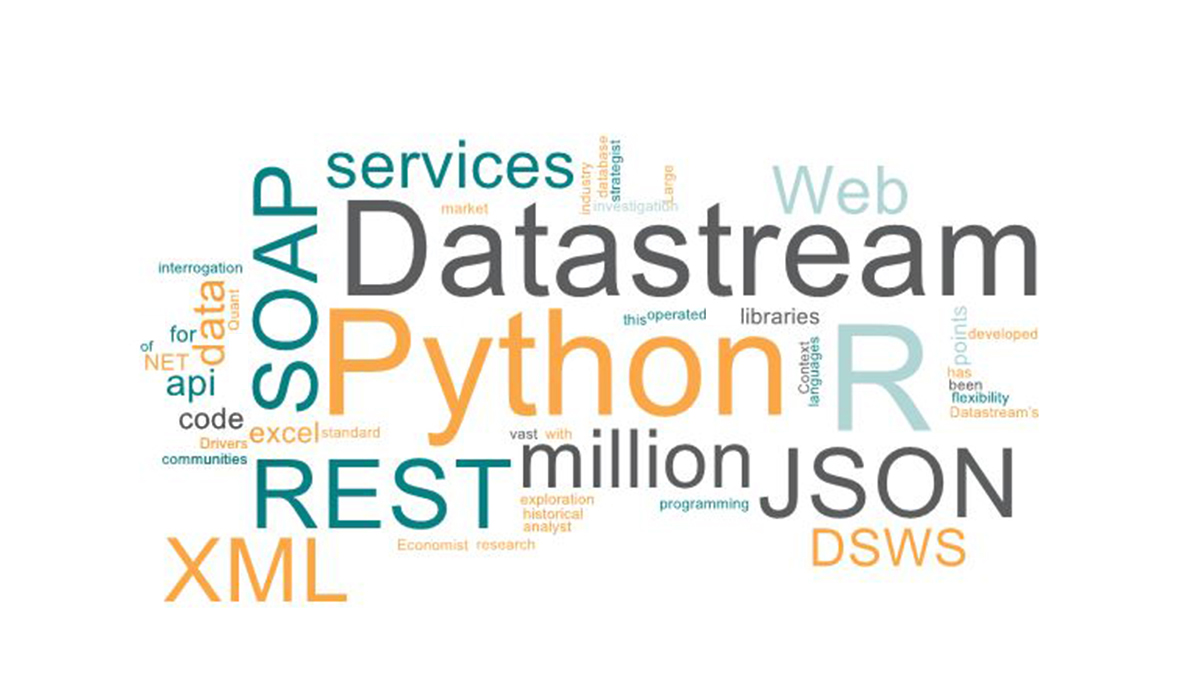What Programming Language Should Economists Learn
which programming linguistic communication should i learn for economic science
Why are economists learning to lawmaking? Economists have always had to crunch and test information sets, simply now more are using coding languages, such as R and Python, to increment efficiency so they can ultimately run more circuitous models.
- The appeal of large information analysis techniques is now broadening exterior of information scientists.
- Economists are learning to code, helping them to benefit from the capabilities of big data software.
- Vast data sets are becoming less manageable in spreadsheets, whereas new systems can manage the task in a matter of minutes. Datastream's DSWS web service solution has become the data source choice for many in this sector.
For more data-driven insights in your Inbox, subscribe to the Refinitiv Perspectives weekly newsletter.
Big data is permeating all of our lives and we're seeing more end users of our products now able to code, utilizing their skills in manipulating and interrogating large quantities of data for business concern and market intelligence.
Tech leaders in this space are building a whole spectrum of solutions and they are not simply targeted at data scientists.
Andrea Zazzarelli, technical manager at Fathom Consulting, a leading independent macro enquiry consultancy, has spotted a growing trend of economists, outside of academia, adopting and learning programming languages.
Economists accept been seen every bit boring adopters of coding. One of the main reasons behind this is that they have non really used data on the aforementioned calibration as data scientists. Zazzarelli observes this change seems to be fueled by the greater flexibility offered past these coding languages, such as breadth of functionalities, their constant evolution, calculating speed, and interoperability beyond systems.
Consequently, the appeal of large data analysis is now broadening among economists.
He remembers that among the key factors backside his decision to learn R, about six years ago, were itsopen source natureand strong support from the coder community.

Large data analysis
Economists tend to deal with data that is both of lower frequency and has more established theoretical foundations than the loftier frequency levels and iterative data tests of data scientists.
But as the mod economy becomes increasingly digitized, greater calculating power and novel data sources are throwing out opportunities to rethink established economical relationships. For example, Zazzarelli routinely uses clustering techniques borrowed from information scientists. He sees the rich information on online consumer spending as an area where similar techniques could disrupt the more than established, but less revealing consumer surveys.
He sees the benefits from programming in R as particularly relevant in his nugget allocation piece of work. R allows his team to combine, manipulate and test economic and financial relationships more effectively under one modeling environment.
Zazzarelli besides noted that coding languages are spelling the terminate of the monster spreadsheets and the demand to crawl through them.

For instance, Fathom'southward Financial Vulnerability Indicator is an early on warning arrangement providing high frequency updates on state risk for over 170 countries. Data at this level is becoming less manageable in spreadsheets, a elementary refresh tin can have hours, whereas new systems tin can manage the job in a matter of minutes.
Information technology makes far more sense to learn to code and use a programming language to manipulate this kind of data.
The benefits of learning to code?
This sentiment is echoed by Charles Cara, head of quantitative strategy at Absolute Strategy Inquiry.
Back in 2007, he was faced with the challenge of manipulating large data sets and finding technology to help him. Cara had the foresight to invest his time and energy into learning to code.
Back then, coding was often bars to the dorsum part, but now has become a front of house profession with the ascent of information scientists, and the increasing use of languages such as SQL , Python, R, JAVA, C++, C#.
He was doing research with a tiptop down approach and he identified R as a linguistic communication that could help him produce potent graphics, had a library of math functions, connected well to other tools and had a wide use of integration with other packages.
R became the programming linguistic communication of his pick.
Cara is cocky-taught, and claims it's like learning a spoken language and that 'Only similar whatever language you need to exercise a picayune bit every solar day'. He has been doing a bit every mean solar day for the last seven years having left investment banking concern Merrill Lynch to join Absolute Strategy, and has since helped them build up a leading market proposition.
They are currently servicing clients who manage in backlog of Us$5 trillion and the company has two employees that work on helping Cara with his data needs.
One time he has established the data mining parcel, he just re-runs it whenever he needs to.
A simple refresh of the complex indicators, charts, factor assay and indices, takes a lot of the workload out, and ways he can provide fourth dimension sensitive information more quickly to his clients.

Accurate insights
Sourcing the right data is of course imperative or whatsoever assay would be flawed.
Cara'southward preference is Datastream's DSWS spider web service solution, as it gives him the depth and breadth of authentic data required for such large information mining tasks.
This has been reflected in his data usage, with his company being i of the meridian users of Datastream.
When you start adding upwardly some assay data points of say 170 countries, beyond 10 years of daily information with eight variables, y'all tin can quickly arrive atover 5 million data points.
The biggest headache for professionals working with engineering is the speed of change, as the language choice of today could be out of way tomorrow.
YouTube and GitHub are known sources for helping you go on on top of what is going on.
It's also good to be part of a community to go on your cognition current. Cara, for case, has set upward his own, GIThub page, and recommends attending Meetup groups.
Time investment
If y'all want to remain ahead of the technology bend, yield or recruitment curve, in today'southward digitized economy, learning to code would be fourth dimension well spent.
You may not have ambitions to become a scientist in this area, but even developing some knowledge could show invaluable to your working life.
The claiming at present is knowing how to employ and suit the techniques developed past data scientists for your own needs.
Coding for Economists
GRADUATE PROGRAM (& ADVANCED Certificate) STATUS
| Mandatory | Master of Arts in Economics |
| Constituent | Physician of Philosophy in Economic science |
Course Level: Main'sCampus: ViennaCourse Open to: Students on-siteRemote studentsAcademic Yr: 2020-2021Term: FallHost Unit: Department of Economics and Business
Teacher: Miklós Koren
Usa Credits: 2ECTS Credits: 2Course Description:
The course can exist followed online if the student has a valid reason (approved by the program manager) for not being able to show upwardly for class. If classroom instruction is allowed, the student is expected to make every effort show up in the classroom.
Content. This course teaches how to organize data and code on your figurer, how to write simple programs in Python to automate tasks, and how to use Stata throughout the steps of your inquiry process.
Relevance. Quantitative enquiry in economic science and other social science requires an effective use of computational tools. The tools and methods used in this course will exist practical throughout other courses and the students' professional person career.Learning Outcomes:
Primal outcomes. Past the end of the course, students will be able to
– Understand folder structure. Perform operations in the command line on files in different folders.
– Automate repeating tasks with Python and Stata scripts, using for loops and functions.
– Read and write data in diverse formats in Stata. Explore information and fix mutual data quality errors.
– Filter, amass, reshape, and combine data for analysis.
Other outcomes. The class volition too help develop skills in the post-obit areas.
| Learning Area | Learning Outcome |
| Critical thinking | Evaluate and compare different computing tools and methods. |
| Quantitative reasoning | Use Markov processes for forecasting. |
| Engineering science skills | Write short programs in Python and Stata.Install and use packages in Python and Stata.Utilize primal programming tools in Python and Stata: functions, loops. |
| Interpersonal communication skills | Convey technical concepts verbally.Collaborate with others on technical tasks. |
| Management cognition and skills | Create software with many components.Organize piece of work components effectively.Run across deadlines. |
| Cultural sensitivity and diversity | Work together with students of dissimilar backgrounds. |
| Ideals and social responsibleness | Understand ethical and legal constraints of acquiring data.Employ good practices of data protection. |
Assessment:
Grading will be based on the total score out of 100, in line with CEU'south standard grading guidelines.
– Grade participation (forty percent)
– Accept-domicile coding assignment (sixty percent)
Prerequisites: none
Source: https://collegelearners.com/which-programming-language-should-i-learn-for-economics/
Posted by: ashleyhentitivinge.blogspot.com


0 Response to "What Programming Language Should Economists Learn"
Post a Comment